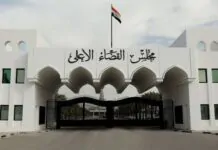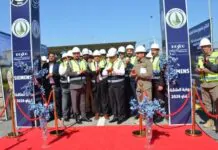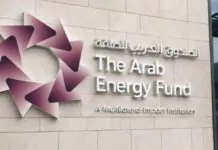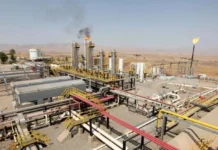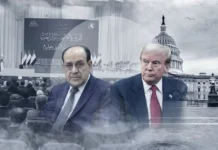Tishwash: Iraq announces a new phase of security cooperation with America
The spokesman for the Commander-in-Chief of the Armed Forces, Sabah al-Nu’man, announced on Friday that Iraqi and American officials are committed to laying the foundations for a new phase of security cooperation, stressing that consultations between the two sides regarding the future of the relationship between the two countries will continue .
Al-Nu’man said in a statement received by Shafaq News Agency that “high-level American and Iraqi officials held technical consultations on November 6 in Baghdad regarding the future of the bilateral security relationship between the two countries, in line with the 2008 Strategic Framework Agreement and based on shared national security interests .”
He added that “the participants affirmed their continued commitment to laying the foundations for a new phase of security cooperation between the United States and Iraq that will continue to enable federal Iraq to provide its own security and deliver tangible benefits to both Americans and Iraqis .”
According to the statement, “High-level officials will continue their consultations in the coming months with the aim of strengthening long-term security cooperation and counterterrorism efforts that support and enhance the capabilities and readiness of the Iraqi Federal Security Forces, including the Peshmerga forces, and promote common interests in preserving Iraq’s sovereignty, defeating terrorism, enhancing regional stability, and strengthening economic ties between the two countries link
Tishwash: Iraq closes the import chapter and opens the door to exports… achieving historic self-sufficiency in oil derivatives
In an economic shift that is the first of its kind in more than two decades, the Iraqi government has officially announced a complete halt to the import of key oil derivatives, most notably gasoline, gas oil (kerosene), and white oil, after the country achieved complete self-sufficiency in the production of these materials.
The announcement, which appeared in an official document issued by the office of Prime Minister Mohammed Shia, confirmed that the surplus of these products would be diverted to exports, after domestic production exceeded the level of internal consumption, in a move described as a crucial turning point in the course of the Iraqi energy sector.
This achievement is the culmination of three years of government efforts focused on operating new refineries and rehabilitating refineries damaged by wars and terrorism, within a strategic vision aimed at reducing dependence on foreign countries, especially Iran, which was the main supplier of imported derivatives in previous years.
Iraq, the second largest producer in OPEC, is on the verge of a new phase of energy independence, not limited to oil derivatives, but extending to the natural gas sector as well, as the government recently signed a contract with the American company “Excelerate Energy” to establish a floating platform for liquefied natural gas with a capacity of up to 15 million cubic meters per day, with the aim of supplying power plants with clean fuel and at a lower operating cost compared to fixed platforms.
Prime Minister Mohammed Shia al-Sudani confirmed that his government has set a timetable to achieve complete self-sufficiency in gas by 2028, noting that Iraq now has the ability to produce high-octane gasoline locally, and continues to strengthen its partnerships with American companies to train national staff on the latest energy technologies and develop oil and electricity fields.
This trend comes amid continued fluctuations in Iranian gas supplies, which have long been a double pressure factor on Iraq, both from the side of rising Iranian domestic consumption and from the side of international sanctions imposed on Tehran.
In the same context, Deputy Prime Minister for Energy Affairs and Oil Minister Hayyan Abdul Ghani confirmed that Iraq has managed to achieve a significant increase in production rates within the refining sector, enabling the country to reach self-sufficiency and reducing the need for imports to a minimum, with the expectation that imports will cease entirely by the end of this year.
He pointed to the operation of huge projects such as the Karbala refinery, the rehabilitation of the Al-Sumoud refinery in Baiji, and the opening of new units in the Chinese, Haditha and southern refineries, most notably the FCC unit with a capacity of 55,000 barrels per day.
While Iraq is moving towards full investment in associated gas by 2029, the minister revealed that its investment rate has increased from 53% to 74% since the current government took office, reflecting Iraq’s commitment to implementing the decisions of the Paris Climate Conference and reducing thermal emissions through renewable energy projects under implementation in cooperation with international companies, including the French company Total.
While Iraq is making leaps in the production of oil derivatives, the parliamentary Oil and Gas Committee recorded that refining capacity has reached unprecedented levels, reaching about 1.5 million barrels per day, which has been reflected in reducing the import of regular gasoline to about 15%, and improved gasoline to 80%, with more than 25 million liters per day entering the local market.
Oil expert Ahmed Askar described the government’s decision to halt imports of gasoline, kerosene, and white oil as strategically timed, reflecting effective management of oil resources after the state treasury had been spending billions of dollars annually to cover shortages of these materials. He explained that this shift will free up those billions to be redirected towards development and infrastructure projects, emphasizing that self-sufficiency would not have been achieved without long-term investments in refineries and the development of downstream industries.
Askar did not conceal the existence of future challenges, including the need to ensure the sustainability of production, achieve a stable surplus for export, and regulate the local market in terms of quality and prices. He also pointed to the importance of strengthening strategic reserves of petroleum products and linking refineries to an integrated transportation and distribution system that ensures equitable distribution among the governorates.
With this achievement, Iraq is steadily moving towards ending its dependence on foreign sources for petroleum products and entering a new phase of economic sovereignty over its resources, at a time when the government is working to diversify energy sources and integrate oil and electricity production
With the completion of the major refinery projects, the country is entering a new chapter in its industrial history, one written by planning, not emergency measures; by sovereignty, not need; and by development, not deficit. link
****************
Tishwash: Iraq saves 8 trillion dinars after closing the gasoline import file… an economic step that restores balance to the budget and opens the door to exports for the first time
In an economic transformation considered one of the most significant achievements of the last two decades, Iraq has officially announced its entry into a phase of complete self-sufficiency in petroleum products.
This marks a shift from a country that relied for decades on importing gasoline, gas, and fuel oil to a producer and exporter capable of meeting its domestic needs and opening new avenues for regional and international exports.
This announcement, made in a statement issued by the office of Prime Minister Mohammed Shia al-Sudani on November 4, 2025, represents a turning point in the history of the Iraqi oil industry, following years of continuous work to rehabilitate and operate the major refineries in Karbala, Baiji, and Basra, and to expand production lines to meet increasing domestic and international demand.
Legal and banking researcher Saif Al-Halfi confirmed in a special statement to “Iraq Observer” that Iraq has achieved an unprecedented historical accomplishment in the oil industry, after officially announcing its entry into the stage of self-sufficiency in oil derivatives, moving from the position of an importing country to the position of a producer and exporter, in a step he described as “a qualitative shift in the structure of the national economy and the opening of a new door towards manufacturing industries and clean energy.”
Al-Halfi explained that the oil refining sector represents the backbone of the Iraqi economy today, as it is the bridge that transforms low-priced crude oil into vital, high-value derivatives such as gasoline, kerosene, gas oil, liquefied gas, and jet fuel. He pointed out that the high global and local demand for these derivatives has made developing refineries a strategic goal for the government to reduce imports and preserve hard currency.
He added that the announcement issued by the office of Prime Minister Mohammed Shia Al-Sudani on November 4, 2025, confirmed the achievement of complete self-sufficiency after three years of intensive efforts to rehabilitate and operate Iraqi refineries, including the Karbala refinery, the Baiji refinery, and the expansion of the Basra (Shuaiba) refinery, indicating that this step “astonished foreign refining companies and confused traders who had been exporting derivatives to Iraq for many years.”
Al-Halfi explained that Iraq currently has more than ten major refineries distributed across the north, center, and south of the country. He noted that the Karbala refinery, officially opened in 2023 with a capacity of 140,000 barrels per day, represents a significant leap forward thanks to its use of environmentally friendly technologies and its production of fuel that meets European standards. The Basra (Shuaiba) refinery operates at a capacity of 210,000 barrels per day and is one of the oldest refineries in the country. Meanwhile, the Baiji refinery, which was partially restarted after being damaged in the war against ISIS, is progressing towards restoring its full capacity of 300,000 barrels per day.
Al-Halfi pointed out that the projects of the Maysan refinery with a capacity of 150,000 barrels per day and the Faw refinery with a capacity of 300,000 barrels per day will make Iraq a regional player in exporting oil derivatives, especially since the Faw refinery is designed to be a strategic refinery for exporting high-quality fuel to Europe and America within the “Development Road” projects.
He revealed that Iraq’s current refining capacity is 1.3 million barrels per day, and is expected to rise to 1.6 million barrels per day upon completion of the projects. This will enable the country to export the surplus and generate billions of dollars in revenue annually. He also explained that reducing imports will save approximately $3 billion annually that was previously spent on importing refined products, in addition to bolstering foreign currency reserves and improving the national budget.
Al-Halfi pointed out that this transformation will directly impact the lives of citizens by improving fuel quality and raising the octane level in gasoline to suit modern cars, in addition to improving the quality of kerosene and liquefied gas, and creating thousands of job opportunities in the fields of maintenance, operation, transportation and logistics.
At the same time, he pointed out that there are real challenges that could hinder this success, most notably the smuggling of petroleum products due to price differences between Iraq and neighboring countries, in addition to the age of some refineries, such as Al-Dura and Basra, which require comprehensive modernization. He also noted the shortage of electricity and industrial water, which affects the continued operation of some production units, calling on the government to establish a balanced pricing policy that encourages investment and maintains the economic viability of projects.
He explained that the Iraqi government is working to link the new refineries to export and internal transport pipelines to ensure a fair distribution of derivatives between the governorates, in addition to encouraging foreign investment through the BOT partnership system in the Nasiriyah and Faw refineries, with the aim of enhancing transparency and operational efficiency.
Al-Halfi stressed that this major development reflects the government’s strategic vision of transforming from a crude oil exporting country to a country that manufactures high value-added petroleum derivatives, indicating that the completion of the Karbala, Maysan and Faw projects will enable Iraq to confidently enter the club of oil refining countries, and will place it in a leading regional position in the field of energy and refining.
Al-Halfi concluded his statement by saying: “What is happening today in the refining sector is not just a technical achievement, but a national economic victory. Iraq is writing a new chapter in its industrial history, a chapter whose title is self-sufficiency, production and export, not dependency and importation. With this transformation, the country is getting closer to realizing the dream of cross-border refineries, to transform from an importer of fuel to an exporter of power.”
Iraq produces about 4 million barrels of crude oil daily, but until recently it faced a losing economic equation in the derivatives market, as it used to sell a liter of crude oil for less than 50 dinars, then import it later in the form of gasoline at a price of up to 1200 dinars per liter, before reselling it to citizens for only about 450 dinars, which caused annual losses estimated at about 6 billion dollars, or about 8 trillion Iraqi dinars.
Thus, Iraq is transforming from a fuel consumer to a producer and exporter, a move that is reshaping its national economy and opening new horizons for industrial development and clean energy. With the continued progress of the giant refinery projects in Maysan, Faw, and Nasiriyah, the country is approaching a new phase where the Iraqi economy is being redefined by refined oil, not crude, and by revenues that will bolster economic sovereignty and lay the foundation for a future based on production, not dependence, and on strategic planning, not improvisation. link


